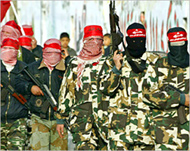Abbas: Truce pact with factions likely
Palestinian President Mahmud Abbas says he is close to reaching a deal with resistance fighters to cease attacks on Israelis.

Palestinian resistance leaders had earlier signalled they would help maintain calm in Gaza for at least a month but denied Israeli accounts that they had committed to a formal ceasefire at the behest of the moderate Abbas.
Abbas, elected this month as Yasir Arafat’s successor, has been trying to get fighters to call off a four-year-old armed revolt against the Israeli occupation so he can start negotiating for statehood in Israeli-occupied territories.
“The dialogue is making very good progress,” Abbas told Palestine Television.
“I can say that we are bound to reach an agreement very soon.”
Palestine Television is due to air its interview in full later in the day on Sunday.
Israeli responsibilities
But underscoring the challenge facing leaders, a senior aide to Israeli Prime Minister Ariel Sharon said only an interim deal was possible in the foreseeable future. Palestinians seek a final treaty giving them a sovereign state.
Palestine Television said that during the interview Abbas stressed Israel had “responsibilities it must carry out” for a ceasefire to work.
 |
|
Abbas has deployed 2000 police |
Israel must “halt its assaults on Palestinian people, cities and villages, stop chasing fugitives, return deportees to their homes and most importantly [deal] with the issue of [releasing] prisoners,” the official television quoted him as saying.
Earlier, Palestinian resistance groups signalled they would shun further attacks on Israelis unless provoked while conducting talks with Abbas expected to go on for about a month, after which a firm decision about a ceasefire could be reached.
Truce?
Both Israel and the resistance groups have avoided going first in declaring a truce. But relative quiet has taken hold in Gaza since Abbas began trying to swing Palestinian fighters behind his agenda of non-violence.
 |
|
Sharon held a cabinet meeting in |
In a further sign of the transformed atmosphere, Sharon held a cabinet meeting on Sunday in Sderot, a southern Israeli town that was being hit by rocket fire from nearby Gaza until a few days ago.
“There is now calm. We don’t know if this is a genuine change yet. We hope so. But one thing is clear – if terrorism resumes, we will act,” said Sharon, who called the cabinet session in Sderot an act of solidarity with its people.
“Military options will only be carried out if the Palestinian Authority (PA) does not succeed in bringing peace and calm,” Israeli Foreign Ministry spokesperson, Marc Reghif, told Aljazeera.
Political price
Khalid al-Batsh, spokesman for the Islamic Jihad movement, told Aljazeera that any truce would not be designed to aid the Israeli occupation.
“The truce that has been discussed will not be in favour of the Israeli occupation,” he said.
 |
|
Resistance fighters say they |
“I think the occupation is very keen to obtain a truce that enables Sharon to withdraw from the Gaza Strip. Sharon does not want withdrawal to be done under calm or a truce.
“In 2003, Hamas and Islamic discussed and announced a truce. What happened was that Israel said the truce was between the Palestinian Authority (PA) and the Palestinian factions as if the problem was between the PA and these factions.
“The matter is different today. We (the Palestinian factions) and Abu Mazin have realised that if a truce takes place, it should have a political price,” he said.
Relative calm
Israel said it understood Abbas had extracted an agreement from the main resistance groups to a month-long truce in return for a share in governing, and Israel was ready to suspend military operations if calm proved durable. Hamas said no such agreement had been reached, but that the movement was willing to enter serious talks should Israel end its aggression.
Earlier in the week Israeli forces raided Nablus in the West Bank, arresting alleged resistance figures, demolishing buildings and firing shells. Several people were wounded.
However, violence in Gaza has dramatically subsided, especially since Abbas’ deployment of 2000 paramilitary security police in the northern half of the territory on Friday with orders to stop the resistance targeting Israelis.
Security men have yet to fan out in southern Gaza and isolated violence has continued, albeit isolated and at a low-level.
Israel plans to evacuate settlers from Gaza this year, a move US-led mediators are counting on to kick-start peace talks. But Israel also aims to keep larger West Bank settlements for good.
Sharon adviser Zalman Shoval said Abbas’ demand, echoing Arafat’s, for a total Israeli withdrawal from lands occupied since the 1967 Middle East war was impossible and therefore “there will be no final accord in our generation, in my opinion”.